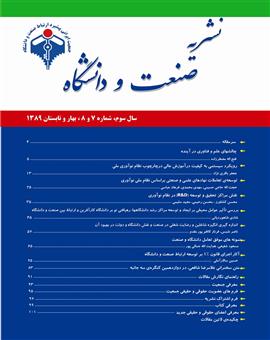اندازه گيري انگیزه شاغلین و رضایت شغلی در صنعت و نقش دانشگاه و دولت در بهبود آن
محورهای موضوعی :ناصر شمس 1 * , فرناز کاظم پور مقدم 2
1 -
2 - دانشگاه صنعتی امیرکبیر
کلید واژه: انگیزه و رضایت شغلی, منطق فازی, همکاری دانشگاه و دولت, نطریه هرزبرگ,
چکیده مقاله :
ارتقای انگیزه کارکنان در هر حوزه کاری نتیجه مستقیم درافزایش بهرهوری آنها دارد. برای دست یابی به این هدف مهم شناخت و اندازهگیری عوامل موثر در ارتقای انگيزه و رضایت شغلی درهر سازمان صنعتی اهمیت بالایی دارد و میتواند مدیران را در تحقق اهداف سازمان یاری دهد. با توجه به اهمیت انگیزه و رضایت شغلی، در مقاله حاضر شاخصهایی برای اندازهگیری انگیزه و رضایت شغلی در یک صنعت خاص بر اساس نظریه هرزبرگ طراحی و تدوین شده و با استفاده از منطق فازي شاخص ها تجزيه و تحليل مي-شود، سپس با توجه به نتایج حاصله راهکارهایی برای بهبود انگیزه کارکنان در صنایع توسط دانشگاه و دولت ارائه میشود. نتایج نشان میدهد که کاربرد شاخصهای طراحی شده باعث ارتقای انگیزه و افزایش رضایت شغلی کارکنان درصنعت مورد مطالعه می-شود
Improving staff motivation in any working area has direct effect on productivity improvement. To achieve this important goal, identification and measurement of factors in promoting motivation is highly important and can help managers in achieving the organization goals. Considering the importance of motivation and job satisfaction, this paper intends to design and develop the indicators to measure motivation and job satisfaction in a specific industry based on the Herzberg theory. By applying fuzzy method and calculating and analysing the indices, guidelines for staff improvement in the industry by Government and university will be provided. The results show that the application of designed indicators will enhance motivation and increase job satisfaction in the studied industry
1. توسلی، غلامعباس، جامعه شناسی کار و شغل، تهران، سمت،
صص 166 تا 170، 1375.
2. سفیری، خدیجه، جامعه شناسی اشتغال زنان، انتشارات تبیان، ص 76، 1377.
3. شرتزر، بروس ای، بررسی و برنامهریزی زندگی شغلی، ترجمه زندی پور، ص 209، 1369.
4. شفیع آبادی، عبدالله، راهنمایی تحصیلی و شغلی، مرکز چاپ و انتشارات دانشگاه پیام نور، 1370.
5. کورمن، آبراهام ک.، روان شناسی صنعتی و سازمانی، ترجمه حسین شکرکن، انتشارات سروش، تهران، صص 236 تا 332، 1370.
6. محمدزاده، عباس و مهروژان، آرمن، رفتار سازمانی نگرش اقتضایی، انتشارات دانشگاه علامه طباطبائی، 1375.
7. Cesen, T., Labour Productivity in Slovenia and International Comparison, International Association for Research in Income and Wealth, 27th General Conference, Djurhamn, Sweden, p.18 to 24 August 2002.
8. Fisher V. E., and Hanna J. V., The Dissatisfied Worker, New York, Macmillan, 1932.
9. George, J.M, & Jones, G.R. Understanding and managing organizational behaviour (2 nd edition), London, Addison Wesley Publishing Company Inc. p.78, 1999.
10. Hellriegel, Don. & Woodman, Richard, Organizational Behavior, South - Western College Publishing An International Thomson Publishing Company, P. 53-55, 1996.
11. Hoppock, R., Job satisfaction, Harper, New York, 1935.
12. Leap, L. Terry & Crion. D. Michael, Personal / Human Resource Management, New York, Macmillan Publishing Company, P. 366-367, 1989.
13. Locke, E., Handbook of Principles of Organizational Behavior: Indispensable Knowledge for Evidence-Based Management (2nd edition), Wiley, 2009.
14. Naoki ,Y., Motivation in The Japanese Public Sector in a Change Context, IDPM , The University of Manchester, 2005.
15. Nghi, T.; and Yecenia Rivera, O., Rewarding and Recognizing Employees: How IT Professionals in Sweden and in Finland are Motivated and Prefer to be Rewarded, Blekinge Institute of Technology, Sweden, Master Thesis in Business Administration, June 2007.
16. Steers, R. M. and Porter, L. W., Motivation and Work Behavior, Fifth Edition. New York: McGraw-Hill, 1991.
17. Takashi, K., Effects of wage and promotion incentives on the motivation levels of Japanese employees, Kobe University, 2008.
18. Thwala, D., and Monese ,W., Nthabiseng, L, Motivation as A Tool to Improve Productivity on The Construction Site, University of Johannesburg, 2008

